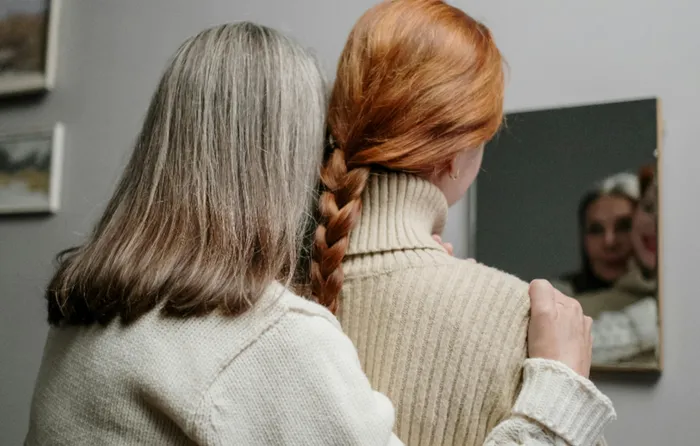Navigating family ties after divorce
Emotional bonds

Is wise - or even healthy - to maintain a cordial relationship with ex in-laws and their family post-divorce, asks the writer?
Image: cottonbro studio/pexels.com
DIVORCE is not merely the ending of a marriage; it often represents a ripple effect that touches every facet of life, including relationships with in-laws and extended family. One of the more complex emotional terrains to navigate after a divorce is the bond shared with your ex-spouse’s family - particularly the younger members, such as nieces, nephews, or cousins, with whom you may have formed deep, affectionate connections.
For many, the emotional bonds built over years do not dissolve overnight. But is it wise - or even healthy - to maintain a cordial relationship with ex in-laws and their family post-divorce?
Let’s explore the nuanced pros and cons of doing so, especially when love and fondness have developed for the younger generation within that family.
One of the most compelling reasons to stay connected to ex in-laws is the genuine emotional bonds that transcend the formal relationship. Children are often innocent bystanders in the adult decisions that cause separation. If you were a positive and consistent presence in their lives, maintaining that bond can offer them emotional continuity. Young family members may have seen you as more than just “uncle” or “aunt by marriage” - you may have been a mentor, confidante, or even a second parent figure.
Staying in touch, attending birthdays, or checking in on them periodically can be meaningful for both them and you. If a relationship was built on mutual respect and love, there’s something to be said for honouring that authenticity. Not all connections need to be sacrificed at the altar of separation. Life is nuanced. Divorce doesn’t erase the kindness, support, or shared memories you may have experienced with certain family members.
Maintaining these connections post-divorce can serve as a reminder that the love shared was real, and not everything about the marriage was a loss. Remaining cordial or friendly with ex in-laws - particularly in a way that centres the younger ones - can showcase emotional maturity. It signals that you are capable of separating the marital breakdown from relationships that were independent of that dynamic.
Children in particular benefit from witnessing grace and dignity in adult interactions. It teaches them that relationships, even when complicated or changing, can be navigated with respect and kindness. For children and teenagers, divorce often brings instability and confusion. Your continued presence may be a grounding force, especially if they looked up to you. You might still be the one who understands their quirks, celebrates their milestones, and reassures them of their worth during turbulent moments.
You don't have to be present every day to make a difference. Sometimes, just a message of encouragement, a small gesture on important dates, or a simple check-in is enough to remind them that not everyone walks away.
However, the cons of such relationships can create significant complications. Despite the best intentions, your presence might stir conflicting loyalties, especially for children. They may feel torn between the affection they hold for you and their sense of loyalty to their biological parent, your ex-spouse. This can result in emotional confusion or guilt, especially if your ex does not approve of ongoing contact. Children shouldn't be placed in the middle of unresolved adult dynamics, and even subtle gestures can sometimes be misinterpreted or weaponised in familial disputes.
Maintaining contact without clear boundaries can become emotionally exhausting or even harmful. It might prevent full closure for you, your ex, or members of their family. If the relationship with your ex was especially painful, ongoing interaction with their family can sometimes reopen wounds or keep you tethered to the past. It’s essential to ask yourself whether your continued engagement with the ex in-laws is coming from a place of genuine connection - or whether it’s an unconscious way of clinging to what was.
If either you or your ex-spouse enters a new relationship, staying connected with former in-laws might raise eyebrows or cause discomfort. New partners may find it difficult to understand or accept these continued ties, potentially leading to tension in new romantic dynamics. While you may see your connection with the younger ones as pure and unproblematic, others might view it through a more sceptical lens, questioning your motivations or emotional availability.
There’s an emotional cost to hovering on the periphery of a family that is no longer officially yours. You may be welcomed with warmth by some and met with silence or suspicion by others. This half-in, half-out existence can feel lonely and disheartening, especially during events like weddings, religious ceremonies, or holidays, where the absence of your former official status becomes more pronounced.
Staying connected but not truly belonging can feel like being a guest in a home you once helped build. Navigating the middle grounds entails a delicate balance of intention and boundaries. It requires open communication with your ex-spouse, especially when children are involved, to ensure that consent and awareness are maintained for the sake of peace. Self-reflection is essential to understand your motivations behind keeping in touch with ex in-laws.
Are these relationships genuinely enriching, or are they a means to avoid grief? Allowing the youngsters to lead the way, if appropriate, ensures that their terms and comfort are prioritised. Clearly defining your role and being mindful of your place in their lives now helps prevent overstepping boundaries. Sometimes, temporary distance can be beneficial, providing space for healing and adjustment before reconnection is possible.
In essence, navigating these relationships with emotional intelligence, firm boundaries, and a willingness to accept change can honour the connections formed while adapting to new dynamics and transitions. Divorce changes the structure of families, but not always the substance of love. If your bond with your ex in-laws, especially the young ones, was meaningful and healthy, it’s possible to carry it forward with grace and intention.
However, it must be navigated with emotional intelligence, firm boundaries, and a willingness to accept that not every relationship will or should survive the transition. At its heart, staying in touch with people you loved is not about resisting change but about honouring connection. When done with clarity, respect, and authenticity, these continued bonds can become threads of continuity in a world of inevitable transformation.

Gaishrie Sharon Singh
Image: File
Gaishrie Sharon Singh is a transformational catalyst, meta-physicist/writer, and author. Visit www.gaishriesharon.co.za. Her new book, Embers of the Soul, was launched at the recenty held Eduvos Durban International Book.
Related Topics: